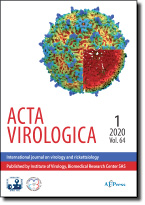Acta Virologica Vol.65, No.1, p.58-67, 2021
|
| Title: In vitro and in vivo antiviral activity of a fluoronucleoside analog, NCC, against Coxsackie virus B3 |
| Author: Yafeng Wang, Xiaokai Zhuan, Youmei Peng, Qing Li, Chenzheng Huang, He Huang, Zongxian Liang, Qingduan Wang, Junbiao Chang |
|
Abstract: Coxsackie virus B3 (CVB3) is believed to be a major cause of viral myocarditis, with virus-induced apoptosis playing an important role in pathogenesis. The purpose of this study was to characterize the antiviral activity of a novel fluoronucleoside analogue, N-cyclopropyl-4'-azido-2'-deoxy-2'-fluoro-β-D-cytidine (NCC), against CVB3 in vitro and in vivo, and to establish whether NCC inhibits apoptosis in infected cells. In this study, HeLa cells infected with CVB3 were treated with NCC. Cell viability and apoptosis were examined. Caspase-3 and Bcl-2 levels were monitored by real-time RT PCR and Western blot analysis. For in vivo studies, BALB/c mice infected with CVB3 were treated with NCC daily. Serum markers of myocardial injury and histological studies were measured to examine myocardial injury on day 8 post-infection. To measure apoptosis, levels of Bcl-2 and caspase-3 were examined by immunohistochemistry and real-time RT-PCR. We found that NCC inhibited virus-mediated cytopathic effects in HeLa cells with an EC50 of 116.60 ± 0.32 μM. In infected mice, administration of NCC (2 mg/kg) decreased the activities of serum creatine kinase and lactic dehydrogenase, inhibited the replication of CVB3 and alleviated damage to the heart. Importantly, NCC suppressed CVB3-induced apoptosis in HeLa cells and affected the expression of apoptosis-related factors in infected mice. Together, our results demonstrate that NCC exerts significant antiviral activities against CVB3. We conclude that NCC is a potential therapeutic agent for the treatment of viral myocarditis.
|
|
| Keywords: coxsackie virus B3; viral myocarditis; N-cyclopropyl-4'-azido-2'-deoxy-2'-fluoro-β-D-cytidine; apoptosis |
|
|
Published online: 01-Feb-2021
|
| Year: 2021, Volume: 65, Issue: 1 |
Page From: 58, Page To: 67 |
doi:10.4149/av_2021_106
|
|
 download file download file |
|
|
|
|
 download file
download file
